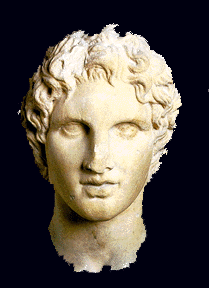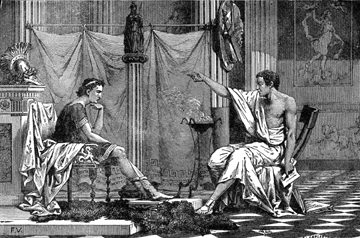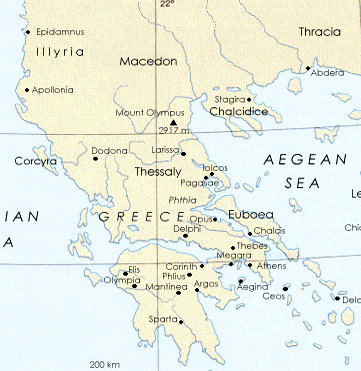|
Alexander Unifies Greece Preparing to Attack Persia

Alexander, at the age of twenty, ascended to the Macedonian throne at the death of his father, Philip II, in the summer of
336 BC. Philip had unified the Greek city-states who had pledged allegiance to him.

Philip II
While only a teenager, he displayed excellent military ability. He was tutored by perhaps the greatest Greek philosopher,
Aristotle.

You can use the map below to follow Alexander's itinerary in solidifying Macedonia and Greece before attacking Persia.

On Philip's death, the kingdom was immediately in trouble. Alexander disposed quickly of all conspirators and domestic enemies
by ordering their execution. He then descended on Thessaly, which had accepted Macedonian rule under Philip but was now being
controlled by partisans of independence. Alexander quickly restored Macedonian rule there. Before the end of the summer of
336 BC he had reestablished his position in Greece and was elected ruler by a congress of states at Corinth. However, other
Greek cities like Athens and Thebes who had pledged allegiance to Philip were unsure if they wished to do the same to a twenty-
year old youth. Furthermore, northern barbarians that Philip had subdued such as the Thracians, were threatening to break
away from Macedonia and wreak havoc in the north.
Alexander's advisors urged that he let Athens and Thebes alone and that he be gentle
with the barbarians to the north so they wouldn't revolt. Alexander was of a different mind. He knew that he had to secure
his northern border if he was going to proceed south to subdue Thebes and Athens and eventually into Asia Minor. Therefore,
in 335 BC he marched toward the Danube River to secure Macedonia's northern frontier. Alexander's was perhaps the greatest
integrated army of antiquity. He combined heavy hoplite infantry, heavy cavalry, light cavalry, skirmishers, and light forces
from several different cultures into an integrated whole.
|
